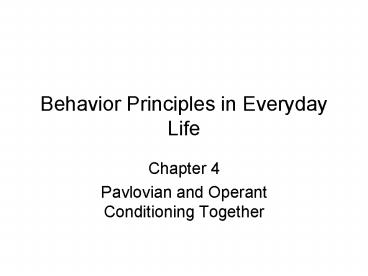Behavior Principles in Everyday Life - PowerPoint PPT Presentation
1 / 9
Title:
Behavior Principles in Everyday Life
Description:
In contrast, operant behavior does not depend on reflexes. ... is about to stick a knife into an electric toaster to fish out a crumbling piece ... – PowerPoint PPT presentation
Number of Views:41
Avg rating:3.0/5.0
Title: Behavior Principles in Everyday Life
1
Behavior Principles in Everyday Life
- Chapter 4
- Pavlovian and Operant Conditioning Together
2
The Differences
- The Role of Reflexes. Pavlovian conditioning
builds from the basic biological reflexes whereas
operant conditioning need not. - In Pavlovian conditioning, a conditioned reflex
(CS ? CR) can be established only if there is
some prior reflex (conditioned or unconditioned)
from which to build. - In contrast, operant behavior does not depend on
reflexes. Most operant behavior has nothing to
do with reflexes (although some of the reflexes
can be partially modified by operant
conditioning).
3
The Differences Cont.
- Eliciting Versus Emitting. An important
difference between the reflexive and operant
behavior is that reflexes are elicited whereas
operants are emitted. Both USs and CSs have the
power to elicit reflexive responses, triggering
them as automatically as pulling the trigger of a
gun fires the weapon. However, SDs do not
automatically trigger operant behavior They
merely set the occasion for the operant which
may or may not be emitted, depending on prior
patterns of reinforcement and other variables.
4
The Differences Cont.
- The Internal-External Continuum. Reflexive
responses tend to promote smooth operation of
internal bodily processes, whereas operant
behavior is usually instrumental in affecting the
external environment. - The Role of Reinforcers. Although reinforcement
is necessary for operant conditioning, it is not
needed for Pavlovian conditioning.
5
The Differences Cont.
- What New Thing is Learned? In Pavlovian
conditioning, a person learns to respond to a new
stimulus At first the new stimulus is a neutral
stimulus (NS), but during Pavlovian conditioning
it becomes a CS that elicits a reflexive
response. In operant conditioning, people learn
new behavior patterns along with sensitivities to
numerous SDs or S?s that cue when the new
behavior may lead to reinforcement, extinction,
or punishment.
6
Pavlovian and Operant Interactions
- CSs for Emotions Can Serve as Reinforcers or
Punishers that Produce Operant Conditioning. Any
stimulus that becomes a CS through Pavlovian
conditioning can function as reinforcer or a
punisher if that CS elicits pleasurable or
aversive emotional responses. - Conversely, CSs that elicit aversive feelings can
serve as punishers and negative reinforcers.
7
Pavlovian and Operant Interactions Cont.
- Pavlovian as a By-Product of Operant. During
operant conditioning, some Pavlovian conditioning
occurs as a side effect. The most common example
of this operant side effect is the Pavlovian
conditioning of emotional responses.
8
Pavlovian and Operant Interactions Cont.
- When a child is about to stick a knife into an
electric toaster to fish out a crumbling piece of
raisin bread, a parent may shout, No! The
parent has used verbal punishment to suppress the
operant behavior of sticking metal objects into
the toaster. In addition, there is a Pavlovian
side effect The stimulus of knife-in-toaster
becomes a CS that elicits anxiety due to its
association with the verbal punishment. In the
future, the CS of knife-in-toaster may elicit
emotions of fear or apprehension even if the
parent is not present.
9
Pavlovian and Operant Interactions Cont.
- Operants Disrupted by Reflexes. Operant behavior
can be disrupted by reflexive responses. - Reflexes Disrupted by Operants. Reflexive
responses can sometimes be interrupted or
suppressed by operant activities. - Reflexes Modified by Operant Conditioning. The
frequency and form of many reflexes can be
modified by reinforcement and punishment.































